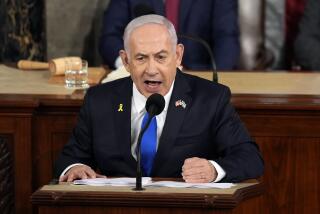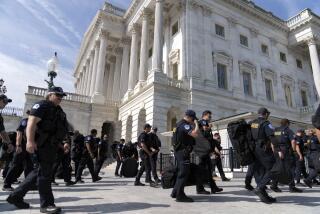Arafat Calls On Congress, Asks Financial Aid
- Share via
WASHINGTON — Palestinian leader Yasser Arafat went calling on Congress on Tuesday, extending his now-famous handshake to dozens of still-incredulous lawmakers and--like countless foreign dignitaries before him--making an impassioned plea for foreign aid.
Chief among his immediate interests was financial support for an interim Palestinian government in Jericho and the Gaza Strip, which will be established under the terms of the accord signed Monday between Israel and the Palestine Liberation Organization.
“I know there are difficulties (over money) in Congress . . . but at least they should give us loan guarantees,” Arafat said.
Earlier, in remarks before the National Press Club, one of several appearances in a final round of diplomacy in Washington, the PLO chairman said that infrastructure in parts of the newly declared Palestinian territory “has been completely destroyed.”
Furthermore, he added, “we are starting from zero” in the Gaza Strip, where unemployment exceeds 56% and people are “starving.”
Later in the day, Arafat went to New York for a scheduled appointment at U.N. headquarters, where Secretary General Boutros Boutros-Ghali awaited him on the 38th floor.
The two men were once bitter enemies. Boutros-Ghali, while serving as the acting Egyptian foreign minister, had helped negotiate the peace treaty between Israel and Egypt in 1979, and Arafat had denounced him in those years as a Christian traitor to the Arab cause.
But the two, smiling broadly, embraced each other and conferred privately in Arabic for 20 minutes.
PLO and U.N. officials then joined Arafat and Boutros-Ghali in the latter’s conference room. A U.N. spokesman said they were discussing ways in which the United Nations could be useful in the economic and political development of the Palestinian-run areas of Jericho and the Gaza Strip.
After this session ended in another 20 minutes, Arafat told reporters that the use of U.N. peacekeepers in Jericho and the Gaza Strip was “under discussion.” He did not elaborate.
The PLO chief said that he and Boutros-Ghali had discussed “many important issues concerning the United Nations’ establishments working in our occupied territories and how to coordinate this organization in the new system so we can have more benefits from the organization.”
The mood was far different from that of 19 years ago, when Arafat last set foot in the United Nations; he had addressed the General Assembly with a gun holster on his hip. Arafat’s spokesman said that the holster was empty, but the gesture rankled the United States, Israel and other Western governments.
There was much speculation in U.N. corridors Tuesday about the need to change many of the anti-Israel resolutions that the General Assembly routinely passes year after year. The resolutions have enraged Israelis and helped persuade them to view the world organization as an enemy agency.
Ambassador Madeleine Albright told reporters that she and other American officials had been discussing the need to make General Assembly resolutions “more Israeli-friendly than they have been, and I think that that should be an easier job to do at this point.”
Although he had been welcomed warmly on Capitol Hill, Arafat received no specific pledges of financial support beyond a promise from congressional leaders to review--and perhaps repeal--legislation barring economic relations with the PLO.
“We have ordered a complete identification of anti-PLO laws,” said Senate Majority Leader George J. Mitchell (D-Me.), who was joined by about 20 senators in an hourlong meeting with Arafat Tuesday morning. “We want to be helpful in the peace process, and if we have to change some laws to be helpful, then we intend to do so.”
If Arafat had hoped for more specific offerings of support, he showed no sense of disappointment as his heavily guarded entourage was whisked through the marbled hallways of Congress to meet first with senators and later--over strawberries, cookies and coffee--with House Democratic and Republican leaders.
“For us, this is a little like Daniel going into the lion’s den,” confessed one PLO source, who noted that Congress has been a bastion of anti-PLO sentiment for many years.
Sen. Claiborne Pell (D-R.I.), chairman of the Senate Foreign Relations Committee, noted that Arafat’s visit would have been “unthinkable just a few weeks ago.”
When asked at the National Press Club luncheon when he expects the United States to announce formal recognition of the PLO, Arafat referred to his meetings Monday with President Clinton and Secretary of State Warren Christopher and his talks with congressional leaders and said, “We have already achieved it.”
Not renowned for his quick wit, Arafat was jovial at the luncheon, frequently parrying reporters’ questions with humor.
Asked to name his primary enemy now that he has pledged to make peace with Israel, Arafat responded, “You . . . because you are quizzing me too much with questions.”
Arafat began his remarks by discarding a prepared text to “speak from heart to heart” in what he said, apologetically, would be fractured English.
Asked about the sharp differences that remain between Israel and the PLO over Jerusalem, Arafat held fast to the PLO position that the eastern half of the city captured from Jordan during the 1967 Six-Day War must be returned to Arab control.
Not all lawmakers were enthusiastic about Arafat’s appearance at Congress.
“Frankly, I still have very deep reservations about the PLO,” said Sen. Connie Mack (R-Fla.), a co-author of some of the anti-PLO legislation that is on the books.
“My heart wants to believe in all this, but my head says we still have to be very careful,” added Rep. Charles E. Schumer (D-N.Y.).
More to Read
Sign up for Essential California
The most important California stories and recommendations in your inbox every morning.
You may occasionally receive promotional content from the Los Angeles Times.













